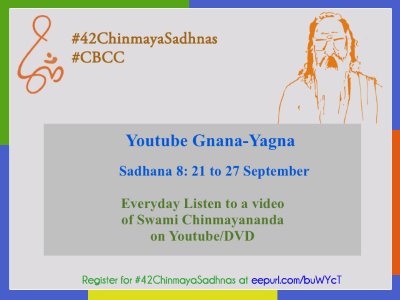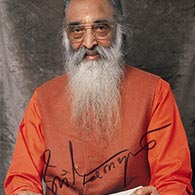Sadhana for Week 8
Intellectual Level: Youtube Gnana-Yagna.
Listen to one video of Poojya Gurudev on Youtube daily
Quote:
To “Listen” is not merely to “hear”.
We in life “hear”, but very rarely do we know how to “listen.”
To “listen” is to “hear” with an intellectual alertness and attention of awareness.

We may “hear” a truth a million times – it just gushes towards us, washes down over us, leaving us just where we were. When we “listen” to a truth even for just once, we are no more the same - we expand, we grow, we deepen – why? Surely because we get totally transformed.
Anecdote:
A banner for a GeetaYagna by Swami Chinmayananda caught the attention of a young man and his family. Out of curiosity they drove to the location. Loud laughter could be heard even before they reached the pandal.
Gurudev was enacting an incident of a dream state where an elephant with a red mini skirt was walking on stiletto heels! People were laughing and holding onto their sides. This family too was no exception, they too were captivated by Gurudev’s magnetic personality and powerful speech.
The laughter died down and Gurudev explained the BMI chart in detail by using his pointer and with his characteristic expression “Think! Think!”
The devotee recounts that for him and his family it was it was an unforgettable experience. On their way out his daughter who had no knowledge of Sanskrit or the scriptures spontaneously cried out, “Mummy, if the Geeta can be taught in this manner, I am prepared to listen to it every day!”
For 42 years Gurudev spoke about and taught the common man the most difficult and subtlest of subjects, Self Knowledge -To know one’s True nature.
What is a Gnana-Yagna?
1. A Yagna is a ritual in which an offering is made. Ritualistic Yagna was followed in the Vedic times in which offerings were made to Devatas through Agni (Lord of Fire) to invoke their blessings for a specific cause. People would come together for a common cause like rain or good harvest for their community, village or town. Each brings whatever they could in the form of flowers, ghee, wood and sinking their differences they would work in harmony for their common cause.
Hence, Swami Chinmayananda explained that Yagna,literally means cooperative endeavor for a selfless purpose. Three aspects must be there:
· Common cause for a higher purpose
· Togetherness
· Sinking all difference and contribute one’s best.
That is why Gurudev called his talks as GnanaYagnas.
In a Yajna, Lord Fire is invoked in the sacrificial trough and into it are offered oblations by the devotees. From this analogy, the term GnanaYajna or Sacrifice-of-Knowledge has been originally coined and used in the Geeta. Study of the Scriptures and regular contemplation upon their deep significances kindle the "Fire-of-Knowledge" in us and into this the intelligent seeker offers, as his oblation, his own false identification, negative tendencies & ignorance. This is the significance of the metaphorical phrase GnanaYajna.
PoojyaGurudev Swami Chinmayananda held his 1stGnanaYagna on 31stDecember, 1951 at the Ganesha Temple in RashtraPeth, Pune.
Gurudev came down from the quietude of the Himalayas, Faced innumerable rebukes and even ostracism from the conservative Brahmins because he chose to share the philosophy & knowledge of Vedanta with the common man (post British era) in a foreign language, English. He dedicated his entire life serving the society selflessly. Even when his heart was working only to 16% of its capacity he continued to give talks so that we are cured of the greatest affliction, the Ego and so that we may rise and recognize the divinity within each of us.
Geeta Verse 33 from Chapter 4 and Geeta Verses 68, 69 from chapter 18 explain more about the JnanaYagna
2. Another meaning of Yagna is the lord Himself. In Vishu Sahasranama Lord Vishnu is called as Yagna. Any action I do which I dedicate to Bhagwan is a yagna.
Poojya Gurudev used to give talks on the Bhagwat Geeta, Upanishads and other scriptures daily, often more than 3 talks a day. For him the stage, the altar, his seat, the whole yagnashala was his pooja room. He looked at himself as the seeker and the audience as his Ishwara. His talks were his prayer to Ishwara.
How to?
1. Every day listen to one video of Poojya Gurudev on youtube or DVDs if you have. (DVDs of Swami Chinmayananda with subtitles are available at chinmayamission.com, chinmayapublications.org & chinmayauk.org)
2. Watch the video at a time when you will not be disturbed at all.
3. Empty your mind of any distractions of any chores to be done or any commitments & engagements to be fulfilled.
4. Watch it without a break.
5. After the talk sit quietly for 5-10minutes and reflect on what the talk was about and what is your take home from it.
If you like, you may follow the following order:
Day 1, 2, 3 - Logic of Spirituality - An Introduction to Vedanta: https://www.youtube.com/watch?v=iB6E316D_Zk
Day 4 - Set a High Goal: https://www.youtube.com/watch?v=c_8mFEO1Kdc
Day 5 - Australian Interview: https://www.youtube.com/watch?v=OrxGTXadYpE
Day 6 - Serve India: https://www.youtube.com/watch?v=zzgHf9oZIkI&list=PLm6DKuwwu5zqR24BWOLNttjJtmUDc6sTM&index=2&spfreload=10
Day 7 - Success with happiness: https://www.youtube.com/watch?v=5vQw0mmcU64
Benefits:
1. Clarity
While listening our doubts and mis-understandings are removed. So many rites, rituals, values, and stories over the years have been handed down to us without any clarity as to why these are being performed. Due to ignorance often they have been misinterpreted. Hence most of us do not want to follow them.
With the right understanding, the significance, the symbolism and the scientific reasoning we get clarity about our culture and develop an admiration for this unique and most ancient living culture in the world.
2. New Insights &Better Understanding
Poojya Gurudev taught the tenets of the scriptures in a manner that all could understand. He interpreted the Geeta and our scriptures in the way it is relevant to us. Until his discourses began, the Geeta was kept in the pooja room only to be dusted and worshipped. People had not opened and read what was written in it. Few pundits and people who had a grasp of Sanskrit, read the Geeta.
42 years of tireless effort brought the Geeta from the pooja room to the drawing room and now to the board room. Students, housewives, corporates – all are now slowly discovering the art of right living for the Geeta is the manual for the Management of Life. It teachings cover all aspects of life,gives us insight into the root cause of our day-to-day problems - be it relationship issues, financial problems, marital discord, career choices, etc.
3. Conviction & Courage
Deeper the understanding, greater is the conviction. Once a person is convinced of the ideal or value,automatically the courage to follow it is developed.
4. Promotes Enquiry
He always reminded people in his humorous way, “longer the beard, greater should be your suspicion” Every talk of his he said “Think! Think! Don’t accept what I am saying!”
In today’s mechanized world we have become auto-pilots in almost every sphere of our life. The focus of education is literacy, not enquiry.
Listening to Pooya Gurudev’s talks develops our faculty of thinking (Vivek).Through enquiry begins our journey to know who am I truly. Our discriminative powers are honed and sharpened through listening, assimilating and reflecting on his talks.
5. Speeds Progress on the Spiritual Path
To be able to listen to Poojya Gurudev’s talks even though he is not in the physical form is a blessing. One must not take this lightly. When heard with compete attention, words spoken by a Master kindle a spark within us.
Through regular study, reflection and practice of the values, one is assured of progress on the spiritual path.
Beginners and Advanced:
Beginners:
1. Start with the video of Logic of Spirituality
2. Listening is the first step in the practice of Vedanta. It is called Shravana.
3. Do as advised above.
Advanced seeker:
1. Do as advised above.
2. While listening to the talk make notes of the key points.
3. Read the notes that you have made as many times as possible in the week.
4. The second step is mananam i.e reflection. Think on what you have heard and noted down. Are you following it in your daily life? Has it made a difference? What was the situation before. Can you better it?
For a blog on Listening, refer to http://notesnmusings.blogspot.in/2014/08/listen.html
For a Ted talk on 5 ways to listen better: http://www.ted.com/talks/julian_treasure_5_ways_to_listen_better
.jpg)
UNTO HIM OUR BEST


